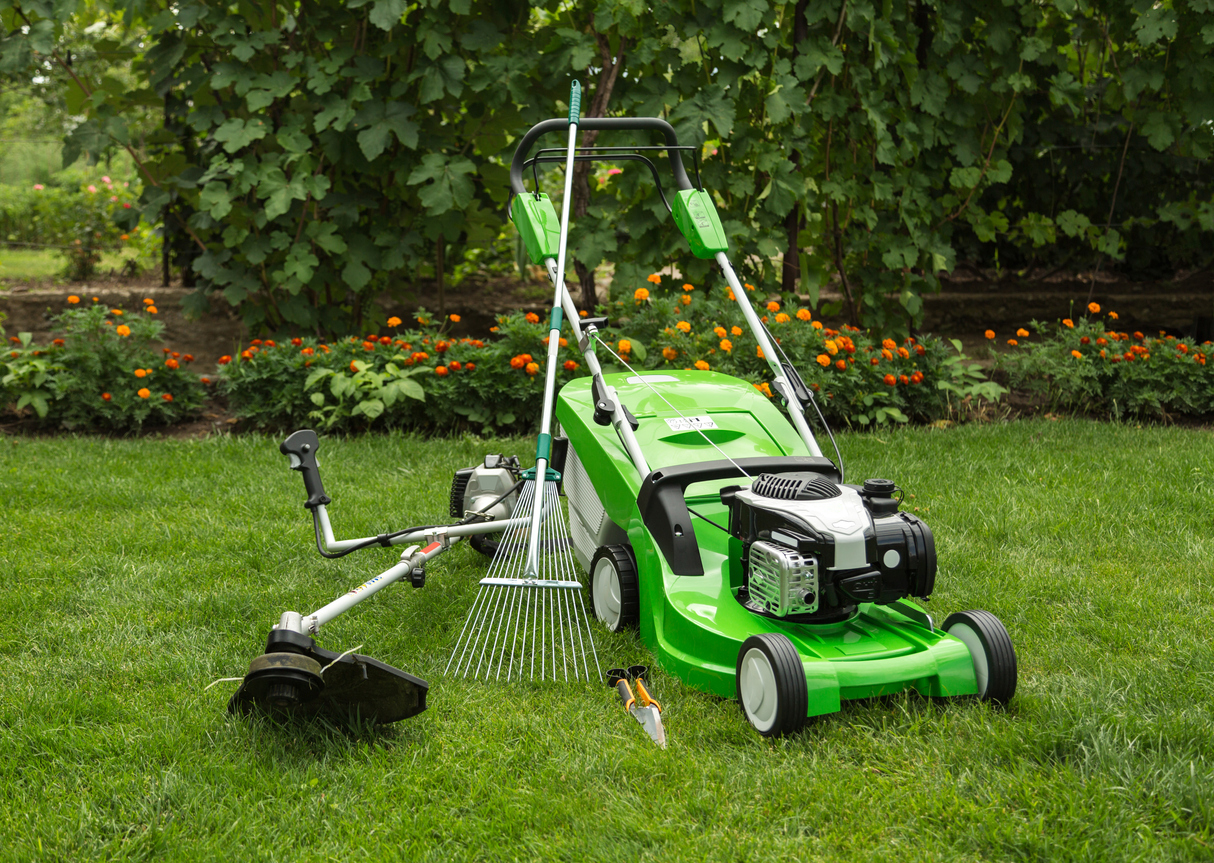

We may earn revenue from the products available on this page and participate in affiliate programs. Learn More ›
When it comes to types of businesses an entrepreneur can start, opting for a lawn care business can be full of benefits. Overall, lawn care business start-up costs are relatively low and the industry has the potential for high revenue; some lawn care businesses can bring in six figures annually. Add to that the perks of independence and spending time outdoors, and starting a lawn care business becomes even more appealing. To offer customers individualized, reliable lawn care, the best lawn care services start with a comprehensive, executable lawn care business plan. Those interested in starting a lawn care business will find the steps listed can help them on their path to a flourishing lawn care business.
Before You Begin…
When entrepreneurs are researching how to start a lawn care business, there are a number of key factors to take into consideration. Before launching a new venture, aspiring business owners will want to consider any existing lawn care businesses in their marketplace, what those businesses have done to be a success, and how a new lawn care business can compete.
In many locations, lawn care isn’t a year-round business, so taking the weather and climate into consideration will help an entrepreneur formulate the right plan. Many lawn care businesses offer winter snow or ice removal in areas with heavy snowfall. Those with milder winters may be able to work nearly year-round if they plan to offer lawn care preparation and seasonal cleanup as part of their services.
Tips for Starting a Lawn Care Business
- Create a well-researched business plan and set a budget.
- Decide on a business structure, such as sole proprietorship or limited liability company (LLC).
- Research required licenses and permits, such as those required for pesticide application.
- Invest in necessary equipment and software.
- Create a targeted marketing plan to create brand awareness and reach a wider client base.
- Recruit and hire employees to help the lawn care business scale.

STEP 1: Write a comprehensive lawn care business plan.
Writing a business plan is a logical first step for any entrepreneur, and it’s no different for a lawn care business. In order to create a robust, actionable business plan for lawn care companies, the owner needs to start off with market research and make decisions about the scope of the lawn care business they want to run. Many lawn care companies begin as a small lawn care business but may scale into a larger operation, so thinking about company structure is important. For example, will this be an LLC or a sole proprietorship? Is the goal to be a solo operation or to eventually become a franchise? A strong lawn care business plan includes a list of the equipment and tools the owner will need from the start, the start-up and operational budget for the business, and a marketing plan that includes outreach to let new customers know that the business is up and running.
STEP 2: Choose a business structure and register your business name.
There are several different structures an entrepreneur can choose for their business, including a sole proprietorship, a partnership, a corporation, an S corporation, or a limited liability company (LLC). For each of these structures, there are different requirements to register with the state or local government. Business structure affects taxes, paperwork requirements, personal liability, and where potential funding comes from. Aspiring entrepreneurs will want to consider their lawn care business structure carefully, as choosing to restructure in the future may come with restrictions and complications. The U.S. Small Business Administration (SBA) website offers business owners information to help them determine which structure is best for their company. Entrepreneurs can also choose to work with a professional to register their business; for example, they may choose to work with one of the best LLC services, such as LegalZoom or Northwest Registered Agent, to register their business as an LLC.
STEP 3: Get the necessary business licenses and permits as required by your state or local government.
Business owners typically need to register their lawn care business name with state and local governments. They’ll also want to consider the adjacent states where the company may conduct business and research whether the business needs to be registered there as well. Generally, if the company is an LLC, corporation, or partnership, the business owner may be required to register in any state where the company will regularly conduct business. Business names do not need to be registered on a federal level, but paying taxes to both state and federal tax agencies is a requirement.
In addition, the business owner will likely need to get a business license, though the specifics will depend on their location. There are a number of different types of business licenses, and new lawn care business owners will want to research what licenses are required in their area. For example, some states may only require a general business license for lawn care companies to operate legally. Others, however, may require lawn care businesses to obtain special pesticide application certification or permits.
STEP 4: Obtain business insurance coverage.
Lawn care companies frequently work with equipment such as riding lawn mowers or rototillers on clients’ property. They may work on drainage and irrigation as well as lawn care and maintenance. Because of this, purchasing the best insurance for lawn care businesses (such as a policy from NEXT Insurance or Thimble) is a critical investment for any lawn care business. In many cases, a certain amount of insurance coverage is required by law in order for a business to acquire a license and operate legally in the state in which it’s located.
The good news is, the cost of lawn care business insurance is relatively affordable, with the national average at about $45 a month. Having lawn care business insurance can help protect the company in the event of an accident, damage to a client’s property, injuries to a client, and in some cases, stolen or damaged equipment.

STEP 5: Get financing and open a business bank account.
The national average lawn care business start-up cost is $6,900, which includes a business license, taxes, insurance, equipment, and operating supplies. This amount can fluctuate depending on location, existing equipment, and other factors such as number of employees and vehicles. Commercial lawn care companies may need to invest in larger and more powerful equipment, such as one or more of the best riding lawn mowers, rather than basic push mowers, and this can be a larger investment up front. Creating and finalizing a budget, possibly with the help of an accountant, will help a business owner see the profit they need to succeed and help secure the right amount of financing. It’s also essential to have a business bank account to help manage income and outgoing expenses.
STEP 6: Invest in software to help run and organize the business.
With so many moving parts involved in starting a lawn care business, investing in accounting or other business management software can provide a new business owner with the support they need to manage the daily operations of a lawn care business, including scheduling, invoicing, and budget tracking. The best lawn care scheduling software programs (such as Jobber) can help address the specific needs associated with operating a lawn care business.
STEP 7: Purchase quality lawn care tools and equipment.
Starting a lawn care business requires a business owner to invest in certain types of equipment, not the least of which is a lawn mower. Purchasing the best lawn mowers will help any new lawn care business operate successfully. If the lawn care company will operate as a commercial business, with clients that could include golf courses, sports stadiums, or parks, the owner may want to consider larger mowing equipment such as a zero-turn or tractor-style riding lawn mower. Riding lawn mowers are a greater initial investment, but they enable the lawn care business to serve more clients in less time. Entrepreneurs will want to keep in mind that some equipment, such as rototillers or skid-steer loaders, can be rented on an as-needed basis until the business grows.
“Investing in quality equipment and tools will allow you to apply [lawn care products] faster and more efficiently while putting less wear and tear on your body,” says Mark Marino, owner of Lawn Phix, a lawn care company based in Bellingham, Massachusetts. “I now primarily use a ride-on spreader/sprayer with a walk-behind fertilizer spreader and two battery backpack sprayers (one for herbicides and one for liquid nutrition). This setup has instantly doubled the number of properties I complete daily…compared to [using] the push spreader and battery backpack sprayer alone. Plus, I’m less tired at the end of the day, and it’s a lot of fun to ride around, too.”

STEP 8: Invest in top-quality lawn care products.
In addition to having quality tools, a new lawn care business will need to have a selection of quality lawn care products, such as fertilizer, weed control, and pest control products. Lawn care businesses can keep these types of products on hand to make it easier to maintain and beautify clients’ yards.
There are several factors for aspiring lawn care business owners to keep in mind while researching the best lawn care products for their company. First, they’ll want to consider safety. There is a lot of value in choosing a company that offers environmentally friendly products, and doing so could give a lawn care company an edge against the competition if other companies in the area aren’t using eco-friendly products. Second, they’ll want to think about the reputation of the company providing the lawn care products they’re considering. Entrepreneurs can research the different brands available, asking local companies what products they recommend and reading reviews on the effectiveness of each type of product.
Lawn care products are a critical component of any lawn care business, so it’s vital that an entrepreneur include them in their budget and shop around to find the best products for their money.
STEP 9: Choose and price the services your lawn care business will offer.
It’s common for many lawn care companies to offer up-front pricing on their website and on flyers or advertisements. By researching the lawn care cost in the area in which the lawn care business will operate, new lawn care companies can remain competitive in their local market. The national average cost for lawn care services is $124, with a range between $48 and $206. Pricing can be dependent on many factors including geographic location, frequency of service, lawn size, and any additional services the lawn care business will offer, such as pesticide application, additional landscaping services, or seasonal cleanups. In areas with heavy snowfall, many lawn care businesses pivot to offer snow removal and holiday lights installation.

STEP 10: Create a marketing plan to build a solid client base.
A marketing plan is an integral part of cultivating and maintaining a client base. Marketing includes everything from lawn care business cards to a dynamic website. It also includes targeted advertising, such as flyers and door hangers, in neighborhoods businesses wish to serve. The use of social media outreach is also important to build brand identity and interact with customers.
Another way for a lawn care business owner to get more clients is to tap into their existing customer base. “Something that’s worked really well for us is simple word-of-mouth advertising,” says Jeremy Yamaguchi, founder of Lawn Love. “We’ve gathered tons of new customers simply through being recommended by satisfied customers. We make it a habit to always ask our satisfied customers to recommend us after completing a job for them, and we also run lots of promotions where we will offer discounts to people who recommend and get others to do business with us. Lawn care is one of those services that is inherently personable and connection-focused, which is why this has always been an effective approach for us.”
Additionally, entrepreneurs will want to consider purchasing vehicle wraps or magnets with their business name, logo, and contact information and place them on their business vehicles. This helps the business become more visible in the community, which can attract more customers. Finally, business owners can ask their current customers if they can place a yard sign with their business info on the customer’s property—this way, passersby can see the business’s contact information while also admiring their handiwork.
STEP 11: Hire employees to help you run your lawn care business.
While a small lawn care business may start out with a single owner and operator, the workload will grow alongside the client base. In order to effectively scale a business, many lawn care companies will reach a point at which they will need to hire employees. Investigating the average wage and benefits will be a big step in the process for the business owner. Offering employees a fair wage and good benefits will help with employee retention, and it can help ensure trust and loyalty between employer and employee.
“I have seen wages increase steadily over the past 10 years. For instance, an inexperienced crew member started at about $11 per hour in 2014 compared to $18 per hour today,” says Jennifer Nichols, president of GreenWeaver Landscapes in Lenni, Pennsylvania. “Along with wage increases, benefits have grown over the years, and we now offer health and dental insurance, a retirement plan, and liberal vacation and education benefits for all new hires…Landscaping is a skilled profession and our employees deserve a living wage, just like all the other trades. I believe the public is beginning to understand and accept this. This simply means that wages will most likely continue to increase in the near future, and they should.”
When learning the ins and outs of how to start a lawn care business, from writing an initial business plan and securing funding to marketing and hiring employees, entrepreneurs can create a thriving business that helps beautify the neighborhood while earning a living wage. By dedicating the time up front to create a well-researched business plan, the grass really will grow greener.
